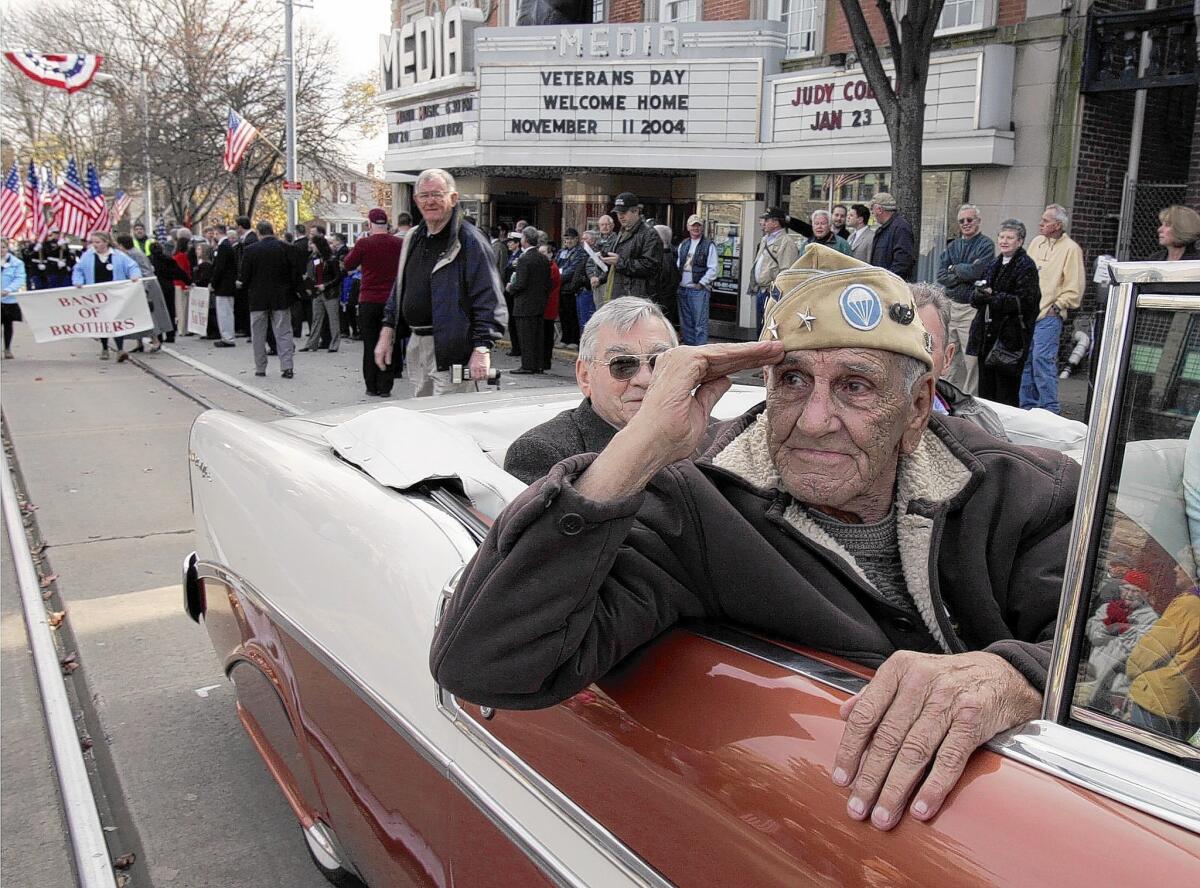William Guarnere dies at 90; member of legendary WWII ‘Band of Brothers’

- Share via
William Guarnere didn’t have to go to war.
At the time of the Pearl Harbor attack in 1941, he was building tanks at the old Baldwin Locomotive Works in Philadelphia, a job considered crucial to the war effort and good for an exemption from military service.
But Guarnere didn’t take it. He enlisted in the Army paratroops on Aug. 31, 1942, and went to battle.
FOR THE RECORD:
An earlier version of this article incorrectly included William Guarnere’s late wife, the former Frances Peca, in a list of surviving family members.
“Wild Bill” Guarnere, the nickname he earned as a fearless combat soldier against the Germans, was a member of the legendary “Band of Brothers” — Easy Company, 506th Parachute Infantry Regiment, 101st Airborne Division — celebrated in books and an HBO miniseries in 2001.
Guarnere, a South Philadelphia native who was awarded the Silver Star and two Purple Hearts among other decorations in World War II combat, lost a leg at the Battle of the Bulge in Belgium in 1944 and returned home to live a productive life unimpaired by his injury, died Saturday of a ruptured aneurysm. He was 90.
Guarnere had a special grudge against the Germans. His older brother, Henry, had been killed in combat at Monte Cassino in Italy, and he wanted revenge.
He made his first combat jump on D-Day, June 6, 1944, the Allied invasion of Normandy. Easy Company landed behind enemy lines right into a firefight raging in the town of Sainte-Mere-Eglise.
“I couldn’t wait to get off the plane,” he said in a 2010 interview with the Philadelphia Inquirer. “I killed every German I could. That’s why they called me ‘Wild Bill.’”
His unit was assigned to secure the village of Sainte-Marie-du-Mont to block Germans retreating from Utah Beach, one of the five beaches in the Normandy invasion.
When his unit encountered a detachment of German soldiers, Lt. Richard Winters told his men to wait for his command to fire. But Guarnere couldn’t wait. He opened fire with his submachine gun and wiped out most of the German patrol.
Later that day, Winters’ unit attacked a group of four large howitzers at Brecourt Manor. Guarnere was a platoon sergeant when his force of only a dozen men attacked an enemy unit of about 50.
He was wounded in mid-October 1944 when he was shot in the right leg by a sniper while riding a motorcycle he had liberated from a farmer near the Rhine River. He fell off the bike, broke his right tibia and took shrapnel in his back.
He was sent to a hospital in England. While recovering, he feared he would be assigned to another outfit, and he managed to flee the hospital. He was caught, court-martialed, busted to the rank of private and sent back to the hospital.
He warned authorities that he would just go AWOL again to get back to his outfit. The hospital officials finally relented and sent him to the Netherlands, where he rejoined Easy Company.
Guarnere was in time to participate in the ferocious Battle of the Bulge after the German army had made a breakthrough in the bitter winter of December 1944.
He lost his right leg in a German artillery barrage while helping a wounded comrade.
He received the Silver Star medal for the action at Brecourt Manor on D-Day and later received two Bronze Stars for valor and two Purple Heart medals for his wounds.
Guarnere and another Easy Company veteran from Philadelphia, Edward “Babe” Heffron teamed with journalist Robyn Post to write a 2007 book, “Brothers in Battle, Best of Friends: Two WWII Paratroopers from the Original Band of Brothers Tell Their Story.”
Guarnere was played by actor Frank John Hughes in the TV miniseries, based on the Stephen Ambrose book of the same title.
Born in Philadelphia on April 28, 1923, Guarnere was the youngest of the 10 children of Joseph and Augusta Guarnere. While working nights at the locomotive works, he graduated from South Philadelphia High School in 1941.
After the war, Guarnere worked for manufacturing firms in Philadelphia, among other jobs.
He is survived by two sons, Eugene and William Guarnere Jr.; nine grandchildren and 14 great-grandchildren.
Morrison writes for the Philadelphia Daily News and McClatchy Newspapers.
More to Read
Start your day right
Sign up for Essential California for the L.A. Times biggest news, features and recommendations in your inbox six days a week.
You may occasionally receive promotional content from the Los Angeles Times.




